Probiotics to prevent necrotising enterocolitis in very preterm or very low birth weight infants
- PMID: 33058137
- PMCID: PMC8094746
- DOI: 10.1002/14651858.CD005496.pub5
Probiotics to prevent necrotising enterocolitis in very preterm or very low birth weight infants
Update in
-
Probiotics to prevent necrotising enterocolitis in very preterm or very low birth weight infants.Cochrane Database Syst Rev. 2023 Jul 26;7(7):CD005496. doi: 10.1002/14651858.CD005496.pub6. Cochrane Database Syst Rev. 2023. PMID: 37493095 Free PMC article.
Abstract
Background: Intestinal dysbiosis may contribute to the pathogenesis of necrotising enterocolitis (NEC) in very preterm or very low birth weight infants. Dietary supplementation with probiotics to modulate the intestinal microbiome has been proposed as a strategy to reduce the risk of NEC and associated mortality and morbidity. OBJECTIVES: To determine the effect of supplemental probiotics on the risk of NEC and mortality and morbidity in very preterm or very low birth weight infants.
Search methods: We searched Cochrane Central Register of Controlled Trials (CENTRAL; 2020, Issue 2) in the Cochrane Library; MEDLINE Ovid (1946 to 17 Feb 2020), Embase Ovid (1974 to 17 Feb 2020), Maternity & Infant Care Database Ovid (1971 to 17 Feb 2020), the Cumulative Index to Nursing and Allied Health Literature (1982 to 18 Feb 2020). We searched clinical trials databases, conference proceedings, and the reference lists of retrieved articles for randomised controlled trials (RCTs) and quasi-RCTs.
Selection criteria: We included RCTs and quasi-RCTs comparing probiotic supplementation with placebo or no probiotics in very preterm or very low birth weight infants.
Data collection and analysis: We used the standard methods of Cochrane Neonatal. Two review authors separately evaluated trial quality, extracted data, and synthesised effect estimates using risk ratio (RR), risk difference (RD), and mean difference. We used the GRADE approach to assess the certainty of evidence for effects on NEC, all-cause mortality, late-onset infection, and severe neurodevelopmental impairment.
Main results: We included 56 trials in which 10,812 infants participated. Most trials were small (median sample size 149). Lack of clarity on methods to conceal allocation and mask caregivers or investigators were the main potential sources of bias in about half of the trials. Trials varied by the formulation of the probiotics. The most commonly used preparations contained Bifidobacterium spp., Lactobacillus spp., Saccharomyces spp., and Streptococcus spp. alone or in combinations. Meta-analysis showed that probiotics may reduce the risk of NEC: RR 0.54, 95% CI 0.45 to 0.65 (54 trials, 10,604 infants; I² = 17%); RD -0.03, 95% CI -0.04 to -0.02; number needed to treat for an additional beneficial outcome (NNTB) 33, 95% CI 25 to 50. Evidence was assessed as low certainty because of the limitations in trials design, and the presence of funnel plot asymmetry consistent with publication bias. Sensitivity meta-analysis of trials at low risk of bias showed a reduced risk of NEC: RR 0.70, 95% CI 0.55 to 0.89 (16 trials, 4597 infants; I² = 25%); RD -0.02, 95% CI -0.03 to -0.01; NNTB 50, 95% CI 33 to 100. Meta-analyses showed that probiotics probably reduce mortality (RR 0.76, 95% CI 0.65 to 0.89; (51 trials, 10,170 infants; I² = 0%); RD -0.02, 95% CI -0.02 to -0.01; NNTB 50, 95% CI 50 to 100), and late-onset invasive infection (RR 0.89, 95% CI 0.82 to 0.97; (47 trials, 9762 infants; I² = 19%); RD -0.02, 95% CI -0.03 to -0.01; NNTB 50, 95% CI 33 to 100). Evidence was assessed as moderate certainty for both these outcomes because of the limitations in trials design. Sensitivity meta-analyses of 16 trials (4597 infants) at low risk of bias did not show an effect on mortality or infection. Meta-analysis showed that probiotics may have little or no effect on severe neurodevelopmental impairment (RR 1.03, 95% CI 0.84 to 1.26 (five trials, 1518 infants; I² = 0%). The certainty on this evidence is low because of limitations in trials design and serious imprecision of effect estimate. Few data (from seven of the trials) were available for extremely preterm or extremely low birth weight infants. Meta-analyses did not show effects on NEC, death, or infection (low-certainty evidence).
Authors' conclusions: Given the low to moderate level of certainty about the effects of probiotic supplements on the risk of NEC and associated morbidity and mortality for very preterm or very low birth weight infants, and particularly for extremely preterm or extremely low birth weight infants, further, large, high-quality trials are needed to provide evidence of sufficient quality and applicability to inform policy and practice.
Trial registration: ClinicalTrials.gov NCT01315821 NCT00977912 NCT01181791 NCT01375309 NCT02552706.
Copyright © 2020 The Cochrane Collaboration. Published by John Wiley & Sons, Ltd.
Conflict of interest statement
SS is funded by the UK National Institute of Health Research (NIHR) for the review.
NM: the UK NIHR pays a grant to NM's institution.
MXRR has no interest to declare.
SO: the UK NIHR pays a grant to SO's institution. (SR‐PG 13/89/12).
WM: the UK NIHR pays a grant to WM's institution. WM is co‐coordinating editor of Cochrane Neonatal.
Figures
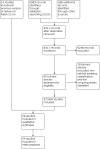
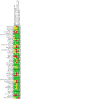
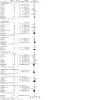
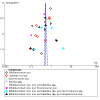
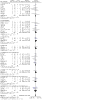
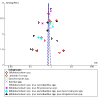
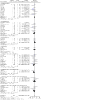
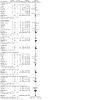
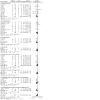
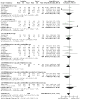
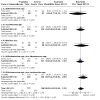
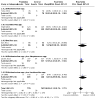
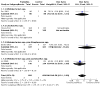
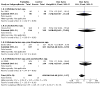
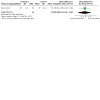
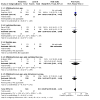
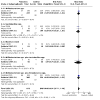
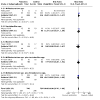
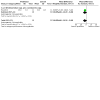
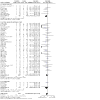
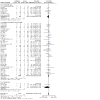
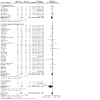
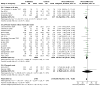
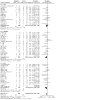
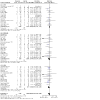
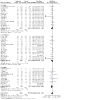
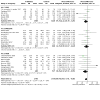
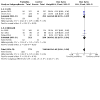
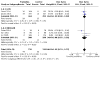
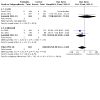
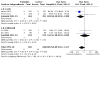
Update of
-
Probiotics for prevention of necrotizing enterocolitis in preterm infants.Cochrane Database Syst Rev. 2014 Apr 10;(4):CD005496. doi: 10.1002/14651858.CD005496.pub4. Cochrane Database Syst Rev. 2014. Update in: Cochrane Database Syst Rev. 2020 Oct 15;10:CD005496. doi: 10.1002/14651858.CD005496.pub5. PMID: 24723255 Updated.
References
References to studies included in this review
Agarwal 2003 {published data only}
Al‐Hosni 2012 {published data only}
Bin‐Nun 2005 {published data only}
Braga 2011 {published data only}
-
- Braga TD, da Silva GA, Lira PI, Carvalho Lima M. Efficacy of Bifidobacterium breve and Lactobacillus casei oral supplementation on necrotizing enterocolitis in very-low-birth-weight preterm infants: a double-blind, randomized, controlled trial. American Journal of Clinical Nutrition 2011;93(1):81–6. [DOI: 10.3945/ajcn.2010.29799] [PMID: ] - DOI - PubMed
Chandrashekar 2018 {published data only}
-
- Chandrashekar GS, Shettigar S, Varghese TC. Role of probiotics in prevention of necrotizing enterocolitis in preterm neonates. Indian Journal of Child Health 2018;5(2):112-5. [DOI: 10.32677/IJCH.2018.v05.i02.010] - DOI
Chowdhury 2016 {published data only}
-
- Chowdhury T, Ali MM, Hossain MM, Singh J, Yousuf AM, Yasmin F, et al. Efficacy of probiotics versus placebo in the prevention of necrotizing enterocolitis in preterm very low birth weight infants: a double-blind randomized controlled trial. Journal of the College of Physicians and Surgeons Pakistan 2016;26(9):770-4. [PMID: ] - PubMed
Chrzanowska‐Liszewska 2012 {published data only}
-
- Chrzanowska-Liszewska D, Seliga-Siwecka J, Kornacka MK. The effect of Lactobacillus rhamnosus GG supplemented enteral feeding on the microbiotic flora of preterm infants-double blinded randomized control trial. Early Human Development 2012;88(1):57–60. [DOI: 10.1016/j.earlhumdev.2011.07.002] [PMID: ] - DOI - PubMed
Costalos 2003 {published data only}
Costeloe 2015 {published data only}
Dani 2002 {published data only}
-
- Dani C, Biadaioli R, Bertini G, Martelli E, Rubaltelli FF. Probiotics feeding in prevention of urinary tract infection, bacterial sepsis and necrotizing enterocolitis in preterm infants. A prospective double-blind study. Biology of the Neonate 2002;82(2):103-8. [DOI: 10.1159/000063096] [PMID: ] - DOI - PubMed
Dashti 2014 {published data only}
-
- Dashti AS, Afjey SA, Basiry A, Shirvani F, Seifi K, Taheri ZM. Prophylactic probiotics for prevention of necrotizing enterocolitis (NEC) in low birth weight neonates. Archives of Pediatric Infectious Diseases 2014;1(4):174-9. [DOI: 10.5812/pedinfect.11603] - DOI
Demirel 2013 {published data only}
Dilli 2015 {published data only}
-
- Dilli D, Aydin B, Fettah ND, Ozyazıcı E, Beken S, Zenciroglu A, et al. The propre-save study: effects of probiotics and prebiotics alone or combined on necrotizing enterocolitis on very low birth weight infants. Journal of Pediatrics 2015;166:545-51. [DOI: 10.1016/j.jpeds.2014.12.004] [PMID: ] - DOI - PubMed
Dutta 2015 {published data only}
Fernández‐Carrocera 2013 {published data only}
-
- Fernández-Carrocera LA, Solis-Herrera A, Cabanillas-Ayón M, Gallardo-Sarmiento RB, García-Pérez CS, Montaño-Rodríguez R, et al. Double-blind, randomised clinical assay to evaluate the efficacy of probiotics in preterm newborns weighing less than 1500 g in the prevention of necrotising enterocolitis. Archives of Diseases in Childhood. Fetal and Neonatal Edition 2013;98(1):F5-9. [DOI: 10.1136/archdischild-2011-300435] [PMID: ] - DOI - PubMed
Fujii 2006 {published data only}
-
- Fujii T, Ohtsuka Y, Lee T, Kudo T, Shoji H, Sato H, et al. Bifidobacterium breve enhances transforming growth factor beta1 signaling by regulating Smad7 expression in preterm infants. Journal of Pediatric Gastroenterology and Nutrition 2006;43(1):83-8. [DOI: 10.1097/01.mpg.0000228100.04702.f8] [PMID: ] - DOI - PubMed
Hariharan 2016 {published data only}
-
- Hariharan D, Balasubramanian L, Kannappan V, Veluswami G. Probiotic supplementation in VLBW preterm infants improves feeding tolerance and reduces risk of gram negative sepsis. In: Journal of Pediatric Gastroenterology and Nutrition. Vol. 62. 49th Annual Meeting of the European Society for Paediatric Gastroenterology, Hepatology and Nutrition, 2016:655.
Hays 2015 {published data only}
Hernandez‐Enriquez 2016 {published data only}
-
- Hernandez-Enriquez NP, Rosas-Sumano AB, Monzoy-Ventre MA, Galicia-Flores L. Lactobacillus reuteri DSM 17938 in preventing necrotizing enterocolitis in preterm newborns. Pilot study of efficacy and safety [Lactobacillus reuteri DSM 17938 en la prevención de enterocolitis necrosante en recién nacidos prematuros. Estudio piloto de eficacia y seguridad]. Revista Mexicana de Pediatría 2016;83(2):37-43.
Hikaru 2010 {published data only}
-
- Hikaru U, Koichi S, Yayoi S, Hiromichi S, Hiroaki S, Yoshikazu O. Bifidobacteria prevents preterm infants from developing infection and sepsis. International Journal of Probiotics and Prebiotics 2010;5(1):33-6.
Huang 2009 {published data only}
-
- Huang B, Yang H, Huang X. Probiotics supplementation for prevention of necrotizing enterocolitis in very low-birth-weight neonates: a randomized, controlled trial. Journal of Guangdong Medical College 2009;27:37-9.
Indrio 2017 {published data only}
Jacobs 2013 {published data only}
Kanic 2015 {published data only}
Kitajima 1997 {published data only}
Li 2019 {published data only}
Lin 2005 {published data only}
Lin 2008 {published data only}
Manzoni 2006 {published data only}
-
- Manzoni P, Mostert M, Leonessa ML, Priolo C, Farina D, Monetti C, et al. Oral supplementation with Lactobacillus casei subspecies rhamnosus prevents enteric colonization by Candida species in preterm neonates: a randomized study. Clinical Infectious Diseases 2006;42(12):1735-42. [DOI: 10.1086/504324] [PMID: ] - DOI - PubMed
Manzoni 2009 {published data only}
-
- Manzoni P, Meyer M, Stolfi I, Rinaldi M, Cattani S, Pugni L, et al. Bovine lactoferrin supplementation for prevention of necrotizing enterocolitis in very-low-birth-weight neonates: a randomized clinical trial. Early Human Development 2014;90(Suppl 1):S60-5. [DOI: 10.1016/S0378-3782(14)70020-9] [PMID: ] - DOI - PubMed
-
- Manzoni P, Rinaldi M, Cattani S, Pugni L, Romeo MG, Messner H, et al, Italian Task Force for the Study and Prevention of Neonatal Fungal Infections, Italian Society of Neonatology. Bovine lactoferrin supplementation for prevention of late-onset sepsis in very low-birth-weight neonates: a randomized trial. JAMA 2009;302(13):1421-8. [DOI: 10.1001/jama.2009.1403] [PMID: ] - DOI - PubMed
-
- Manzoni P, Sánchez RG, Meyer M, Stolfi I, Pugni L, Messner H, et al, Italian Task Force for the Study, and Prevention of Neonatal Fungal Infections and the Italian Society of Neonatology. Exposure to gastric acid inhibitors increases the risk of infection in preterm very low birth weight infants but concomitant administration of lactoferrin counteracts this effect. Journal of Pediatrics 2018;193:62-7.e1. [DOI: 10.1016/j.jpeds.2017.09.080] [PMID: ] - DOI - PubMed
Mihatsch 2010 {published data only}
Millar 1993 {published data only}
Mohan 2006 {published and unpublished data}
-
- Mohan R, Koebnick C, Schildt J, Schmidt S, Mueller M, Possner M, et al. Effects of Bifidobacterium lactis Bb12 supplementation on intestinal microbiota of preterm infants: a double-blind, placebo-controlled, randomized study. Journal of Clinical Microbiology 2006;44(11):4025–31. [DOI: 10.1128/JCM.00767-06] [PMID: ] - DOI - PMC - PubMed
Oncel 2014 {published data only}
-
- Oncel MY, Sari FN, Arayici S, Guzoglu N, Erdeve O, Uras N, et al. Lactobacillus reuteri for the prevention of necrotising enterocolitis in very low birth weight infants: a randomised controlled trial. Archives of Disease in Childhood Fetal & Neonatal Edition 2014;99(2):F110–5. [DOI: 10.1136/archdischild-2013-304745] [PMID: ] - DOI - PubMed
Oshiro 2019 {published data only}
-
- Oshiro T, Nagata S, Wang C, Takahashi T, Tsuji H, Asahara T, et al. Bifidobacterium supplementation of colostrum and breast milk enhances weight gain and metabolic responses associated with microbiota establishment in very-preterm infants. Biomedicine Hub 2019;4(3):1-10. [DOI: 10.1159/000502935] [PMID: ] - DOI - PMC - PubMed
Patole 2014 {published data only}
-
- Agrawal S, Pestell CF, Granich J, Rao S, Nathan E, Wray JA, et al. Difficulties in developmental follow-up of preterm neonates in a randomised-controlled trial of Bifidobacterium breve M16-V—Experience from Western Australia. Early Human Development 2020;151:105165. [DOI: 10.1016/j.earlhumdev.2020.105165] [PMID: ] - DOI - PubMed
-
- Patole S, Keil AD, Chang A, Nathan E, Doherty D, Simmer K, et al. Effect of Bifidobacterium breve M-16V supplementation on fecal bifidobacteria in preterm neonates - a randomised double blind placebo controlled trial. PLOS One 2014;9(3):e89511. [DOI: 10.1371/journal.pone.008951] [PMID: ] - DOI - PMC - PubMed
Rehman 2018 {published data only}
-
- Rehman SU, Iqbal A, Ali W. Role of probiotics in reducing frequency of necrotizing enterocolitis in preterm neonates. Pakistan Pediatric Journal 2018;42(3):171-6.
Ren 2010 {published data only}
-
- Ren B. Preventive effect of Bifidobacterium tetravaccine tablets in premature infants with necrotizing enterocolitis. Journal of Pediatric Pharmacy 2010;16(2):24-5.
Reuman 1986 {published data only}
Rougé 2009 {published data only}
-
- Rougé C, Piloquet H, Butel MJ, Berger B, Rochat F, Ferraris L, et al. Oral supplementation with probiotics in very low-birth-weight preterm infants: a randomized,double-blind, placebo-controlled trial. American Journal of Clinical Nutrition 2009;89(6):1828-35. [DOI: 10.3945/ajcn.2008.26919] [PMID: ] - DOI - PubMed
Roy 2014 {published data only}
-
- Roy A, Chaudhuri J, Sarkar D, Ghosh P, Chakraborty S. Role of enteric supplementation of probiotics on late-onset sepsis by Candida species in preterm low birth weight neonates: a randomized, double blind, placebo-controlled trial. North American Journal of Medical Sciences 2014;6:50-7. [DOI: 10.4103/1947-2714.125870] [PMID: ] - DOI - PMC - PubMed
Sadowska‐Krawczenko 2012 {published data only}
-
- Sadowska-Krawczenko IK, Polak P, Wietlicka-Piszcz A, Szajewska H. Lactobacilllus rhamnosus ATC A07FA for preventing necrotizing enterocolitis in very-low-birth-weight preterm infants: a randomized controlled trial (preliminary results) [Ocena skutecznoci Lactobacillus rhamnosus ATC A07FAw zapobieganiu martwiczego zapalenia jelit wczeniaków z bardzoma urodzeniow mas ciaa: badanie z randomizacj (wstpnewyniki)]. Polish Journal of Pediatrics 2012;87(2):139-45.
Saengtawesin 2014 {published data only}
-
- Saengtawesin V, Tangpolkaiwalsak R, Kanjanapattankul W. Effect of oral probiotics supplementation in the prevention of necrotizing enterocolitis among very low birth weight preterm infants. Journal of the Medical Association of Thailand 2014;97(Suppl. 6):S20-5. [PMID: 25391168] - PubMed
Samanta 2009 {published data only}
Sari 2011 {published data only}
-
- Sari FN, Dizdar EA, Oguz S, Erdeve O, Uras N, Dilmen U. Oral probiotics: Lactobacillus sporogenes for prevention of necrotizing enterocolitis in very low-birth weight infants: a randomized, controlled trial. European Journal of Clinical Nutrition 2011;65(4):434-9. [DOI: 10.1038/ejcn.2010.278] [PMID: ] - DOI - PubMed
-
- Sari FN, Eras Z, Dizdar EA, Erdeve O, Oguz SS, Uras N, et al. Do oral probiotics affect growth and neurodevelopmental outcomes in very low-birth-weight preterm infants? American Journal of Perinatology 2012;29(8):579-86. [DOI: 10.1055/s-0032-1311981] [DOI: 10.1055/s-0032-1311981] [PMID: ] - DOI - DOI - PubMed
Serce 2013 {published data only}
Shadkam 2015 {published data only}
-
- Shadkam MN, Jalalizadeh F, Nasiriani K. Effects of probiotic lactobacillus reuteri (DSM 17938) on the incidence of necrotizing enterocolitis in very low birth weight premature infants. Iranian Journal of Neonatology 2015;6(4):15-20. [DOI: 10.22038/IJN.2015.6143] - DOI
Shashidhar 2017 {published data only}
Stratiki 2007 {published data only}
Strus 2018 {published data only}
-
- Strus M, Helwich E, Lauterbach R, Rzepecka-Węglarz B, Nowicka K, Wilińska M, et al. Effects of oral probiotic supplementation on gut Lactobacillus and Bifidobacterium populations and the clinical status of low-birth-weight preterm neonates: a multicenter randomized, double-blind,placebo-controlled trial. Infection and Drug Resistance 2018;11:1557-71. [DOI: 10.2147/IDR.S166348] [PMID: ] - DOI - PMC - PubMed
Tewari 2015 {published data only}
Totsu 2014 {published data only}
Van Niekerk 2014 {published data only}
Wang 2007 {published data only}
-
- Wang C, Shoji H, Sato H, Nagata S, Ohtsuka Y, Shimizu T, et al. Effects of oral administration of bifidobacterium breve on fecal lactic acid and short-chain fatty acids in low birth weight infants. Journal of Pediatric Gastroenterology and Nutrition 2007;44(2):252-7. [DOI: 10.1097/01.mpg.0000252184.89922.5f] [PMID: ] - DOI - PubMed
Wejryd 2019 {published data only}
Zeber‐Lubecka 2016 {published data only}
-
- Zeber-Lubecka N, Kulecka M, Ambrozkiewicz F, Paziewska A, Lechowicz M, Konopka E, et al. Effect of Saccharomyces boulardii and mode of delivery on the early development of the gut microbial community in preterm infants. PLOS One 2016;11(2):e0150306. [DOI: 10.1371/journal.pone.0150306] [PMID: ] - DOI - PMC - PubMed
References to studies excluded from this review
Arora 2017 {published data only}
-
- Arora S, Khurana MS, Saini R. To study the role of probiotics in the prevention of necrotizing enterocolitis in preterm neonates. International Journal of Contempary Pediatrics 2017;4(5):6. [DOI: 10.18203/2349-3291.ijcp20173787] - DOI
Awad 2010 {published data only}
-
- Awad H, Mokhtar H, Imam SS, Gad GI, Hafez H, Aboushady N. Comparison between killed and living probiotic usage versus placebo for the prevention of necrotizing enterocolitis and sepsis in neonates. Pakistan Journal of Biological Sciences 2010;13(6):253-62. [DOI: 10.3923/pjbs.2010.253.262] [PMID: ] - DOI - PubMed
Chi 2019 {published data only}
Dasopoulou 2015 {published data only}
-
- Dasopoulou M, Briana DD, Boutsikou T, Karakasidou E, Roma E, Costalos C, et al. Motilin and gastrin secretion and lipid profile in preterm neonates following prebiotics supplementation: a double-blind randomized controlled study. Journal of Parenteral and Enteral Nutrition 2015;39(3):359-68. [DOI: 10.1177/0148607113510182] [PMID: ] - DOI - PubMed
Deng 2010 {published data only}
-
- Deng J, Chen K. Early minimal feeding combined with probiotics to prevent necrotizing enterocolitis in preterm infant. Chinese Journal of Modern Drug Application 2010;4(6):13-4.
Denkel 2016 {published data only}
Di 2010 {published data only}
-
- Di M, Li X. Effects of Bifidobacterium supplementation for prevention of necrotizing enterocolitis in preterm infants: a randomized, controlled trial. Zhong Guo She Qu Yi Shi 2010;231:69.
Dongol‐Singh 2017 {published data only}
-
- Dongol Singh S, Klobassa DS, Resch B, Urlesberger B, Shrestha RP. Placebo controlled introduction of prophylactic supplementation of probiotics to decrease the incidence of necrotizing enterocolitis at Dhulikhel Hospital in Nepal. Kathmandu University Medical Journal 2017;15(60):319-23. [PMID: ] - PubMed
Hua 2014 {published data only}
-
- Hua X-T, Tang J, Mu D-Z. Effect of oral administration of probiotics on intestinal colonization with drug resistant bacteria in preterm infants [口服益生菌对早产儿肠道耐药菌定植的影响]. Chinese Journal of Contempoary Pediatrics 2014;16(6):606-9. [PMID: ] - PubMed
Hussain 2016 {published data only}
-
- Hussain M, Jabeen S, Subhani RU. Role of probiotics in prevention of necrotizing enterocolitis in preterm low birth weight neonates. Pakistan Journal of Medicine and Health Sciences 2016;10:455-9.
Kaban 2019 {published data only}
Ke 2008 {published data only}
-
- Ke D, Su Z, Li L. Effects of Bifido supplement for prevention of necrotizing enterocolitis in preterm infants: a randomized controlled trial. Chinese Pediatric Emergency Medicine 2008;12:69-71.
Koksal 2015 {published data only}
-
- Köksal N, Varal İ, Özkan H, Bagcı O, Doğan P. Effect of probiotic support on feeding intolerance and mortality at preterm infants. In: Journal of Perinatal Medicine. Vol. 43. 2015:P-0612.
Moles 2015 {published data only}
-
- Moles L, Escribano E, De Andres J, Montes MT, Rodriguez JM, Jimenez E, et al. Administration of Bifidobacterium breve PS12929 and Lactobacillus salivarius PS12934, two strains isolated from human milk, to very low and extremely low birth weight preterm infants: A pilot study. Journal of Immunology Research 2015;2015:538171. [DOI: 10.1155/2015/538171] [PMID: ] - DOI - PMC - PubMed
Partty 2013 {published data only}
-
- Partty A, Luoto R, Kalliomaki M, Salminen S, Isolauri E. Effects of early prebiotic and probiotic supplementation on development of gut microbiota and fussing and crying in preterm infants: a randomized, double-blind, placebo-controlled trial. Journal of Pediatrics 2013;163:1272-7. [DOI: 10.1016/j.jpeds.2013.05.035] [PMID: ] - DOI - PubMed
Qiao 2017 {published data only}
Rojas 2012 {published data only}
Romeo 2011 {published data only}
-
- Romeo MG, Romeo DM, Trovato L, Oliveri S, Palermo F, Cota F, et al. Role of probiotics in the prevention of the enteric colonization by Candida in preterm newborns: incidence of late-onset sepsis and neurological outcome. Journal of Perinatology 2011;31(1):63–9. [DOI: 10.1038/jp.2010.57] [PMID: ] - DOI - PMC - PubMed
Shujie 2011 {published data only}
-
- Shujie Y, Haiying Y, Bin G, Shu X, Xianglan D, Jiang W. The clinical application value of endangered preterm infants given earlier amounts of micro feedings and adding probiotics. Journal of Pediatric Pharmacy 2011;17:21-4.
Sinha 2015 {published data only}
Thanhaeuser 2014 {published data only}
-
- Thanhaeuser M, Repa A, Weber M, Endress D, Kreissl A, Binder C, et al. Probiotics (infloran) for NEC prevention: Influence of enteral nutrition. In: Archives of Disease in Childhood. 5th Congress of the European Academy of Paediatric Societies, EAPS 2014, Barcelona, Spain. Vol. 99. 2014:A176-7.
Uhlemann 1999 {published data only}
-
- Uhlemann M, Heine W, Mohr C, Plath C, Pap S. Effects of oral administration of bifidobacteria on intestinal microflora in premature and newborn infants newborn infants. Zeitschrift fur Geburtshilfe und Neonatologie 1999;203(5):213-7. [PMID: ] - PubMed
Underwood 2014 {published data only}
Xu 2016 {published data only}
Zhou 2012 {published data only}
-
- Zhou N. The observation of effect of probiotics in the prevention of neonatal necrotizing enterocolitis. Chinese Journal of Ethnomedicine and Ethnopharmacy 2012;21:81.
Zhuang 2007 {published data only}
-
- Zhuang X-Y, Li X-Y, Gao X-X, Su L-D. Relative factors of neonatal necrotizing enterocolitis and preventive effect of microeco-preparation. Journal of Applied Clinical Pediatrics 2006;22:1392-3.
References to studies awaiting assessment
Coleta 2013 {published data only}
-
- Coleta E, Gheonea M, Sarbu M. Oral supplementation with probiotics in premature infants-a randomised clinical trial. In: Intensive Care Medicine. 24th Annual Meeting of the European Society of Paediatric and Neonatal Intensive Care edition. Vol. 39. Rotterdam, Netherlands, 2013:S113.
Punnahitananda 2006 {unpublished data only}ISRCTN39142169
-
- Punnahitananda S, Thaithumyanon P, Soongsawang K. Nosocomial infection and necrotizing enterocolitis in preterm neonates treated with Lactobacillus acidophilus and Bifidobacterium infantis in a neonatal intensive care unit: a randomized controlled study. In: 14th Congress of the Federation of Asia Oceania Perinatal Societies. Bangkok, Thailand, 2006.
References to ongoing studies
Marisen 2019 {published data only}
-
- Marisen J, Hais A, Meyer C, Van Rossum T, Bunte LM, Frommhold D, et al. Efficacy of Bifidobacterium longum, B. infantis and Lactobacillus acidophilus probiotics to prevent gut dysbiosis in preterm infants of 28+0-32+6 weeks of gestation: a randomised, placebo-controlled, double-blind, multicentre trial: the PRIMAL Clinical Study protocol. BMJ Open 2019;9(11):e032617. [DOI: 10.1136/bmjopen-2019-032617] [PMID: ] - DOI - PMC - PubMed
NCT00977912 {unpublished data only}
-
- NCT00977912. Necrotizing enterocolitis (Nec) and B. Lactis in premature babies [Prevention of NEC in preterm Infants with B. lactis]. clinicaltrials.gov/ct2/show/NCT00977912 (first received 16 September 2009).
NCT01181791 {unpublished data only}
-
- NCT01181791. Effects of Lactobacillus reuteri in premature infants (reuteri) [Pilot study to evaluate the effects of Lactobacillus reuteri in preterm newborns]. clinicaltrials.gov/ct2/show/NCT01181791 (first received 13 August 2010).
NCT01375309 {unpublished data only}
-
- NCT01375309. Bifidobacterium supplementation for very low birth weight infants (Bifido(RCT)) [Effect of bifidobacterium bifidum supplementation on morbidity of very low birth weight infants]. clinicaltrials.gov/ct2/show/NCT01375309 (first received 17 June 2011).
NCT04541771 {published data only}
-
- NCT04541771. The role of Lactobacillus reuteri in preventing necrotizing enterocolitis (NEC) in pre-term infants (NEC) [The role of Lactobacillus reuteri (L. reuteri) in preventing necrotizing enterocolitis (NEC) in pre-term infants less than 34 weeks of gestation]. clinicaltrials.gov/ct2/show/NCT04541771 (first received 9 September 2020).
Additional references
Abdulkadir 2016
Alcon‐Giner 2020
-
- Alcon-Giner C, Dalby MJ, Caim S, , Ketskemety J, Shaw A, Sim K, et al. Microbiota supplementation with Bifidobacterium and Lactobacillus modifies the preterm infant gut microbiota and metabolome: an observational study. Cell Reports Medicine 2020;1(5):100077. [DOI: 10.1016/j.xcrm.2020.100077] [PMID: ] - DOI - PMC - PubMed
Battersby 2018
Berrington 2012
Berrington 2019
Bertelli 2015
Besselink 2008
-
- Besselink MG, Santvoort HC, Buskens E, Boermeester MA, Goor H, Timmerman HM, Dutch Acute Pancreatitis Study Group. Probiotic prophylaxis in predicted severe acute pancreatitis: a randomised, double-blind, placebo-controlled trial. Lancet 2008;371(9613):651-9. - PubMed
Bi 2019
-
- Bi LW, Yan BL, Yang QY, Li MM, Cui HL. Which is the best probiotic treatment strategy to prevent the necrotizing enterocolitis in premature infants: a network meta-analysis revealing the efficacy and safety. Medicine 2019;98(41):e17521. [DOI: 10.1097/MD.0000000000017521] [PMID: ] - DOI - PMC - PubMed
Boyle 2006
-
- Boyle RJ, Robins-Browne RM, Tang ML. Probiotic use in clinical practice: what are the risks? American Journal of Clinical Nutrition 2006;83(6):1446-7. - PubMed
Bron 2017
Cleminson 2015
-
- Cleminson J, Oddie S, Renfrew MJ, McGuire W. Being baby friendly: evidence-based breastfeeding support. Archives of Disease in Childhood- Fetal and Neonatal Edition 2015;100(2):F173-8. - PubMed
Duffield 2019
Eaton 2017
-
- Eaton S, Rees CM, Hall NJ. Current research on the epidemiology, pathogenesis, and management of necrotizing enterocolitis. Neonatology 2017;111(4):423-30. [DOI: 10.1159/000458462] [PMID: ] - PubMed
Embleton 2016
Embleton 2017
Esaiassen 2016
Fleming 2019
Gale 2020
Gephart 2020
GRADEpro GDT [Computer program]
-
- McMaster University (developed by Evidence Prime) GRADEpro GDT. Version accessed 8 May 2018. Hamilton (ON): McMaster University (developed by Evidence Prime). Available at gradepro.org.
Granger 2020
Harbord 2006
Hickey 2018
Higgins 2011
-
- Higgins JP, Altman DG, Sterne JA: on behalf of the Cochrane Statistical Methods Group and the Cochrane Bias Methods Group. Chapter 8: Assessing risk of bias in included studies. In: Higgins JP, Green S, editor(s). Cochrane Handbook for Systematic Reviews of Interventions Version 5.1.0 (updated March 2011). The Cochrane Collaboration, 2011. Available from handbook.cochrane.org.
Higgins 2019
-
- Higgins JP, Thomas J, Chandler J, Cumpston M, Li T, Page MJ, et al (editors). Cochrane Handbook for Systematic Reviews of Interventions version 6.1 (updated September 2020). Cochrane, 2020. Available from www.training.cochrane.org/handbook.
Hopewell 2009
Horbar 2012
Jarrett 2019
Jenke 2012
Johnson‐Henry 2016
Koretz 2018
Kunk 2019
Lerner 2019
Mara 2018
Marchand 2012
Martin 2010
Masi 2019
Millar 2012
Morgan 2011
Morgan 2020
-
- Morgan RL, Preidis GA, Kashyap PC, Weizman AV, Sadeghirad B, McMaster Probiotic, Prebiotic, and Synbiotic Work Group. Probiotics reduce mortality and morbidity in preterm, low-birth-weight infants: a systematic review and network meta-analysis of randomized trials. Gastroenterology 2020;159(2):467-80. [DOI: 10.1053/j.gastro.2020.05.096] [PMID: 32592699] - DOI - PMC - PubMed
Ohlsson 2020
Olm 2019
Pammi 2020
Patel 2015
Patel 2018
Pell 2019
Quigley E 2019
Quigley M 2019
Review Manager 2020 [Computer program]
-
- The Cochrane Collaboration Review Manager 5 (RevMan 5). Version 5.4. Copenhagen: The Cochrane Collaboration, 2020.
Robertson 2020
-
- Robertson C, Savva GM, Clapuci R, Jones J, Maimouni H, Brown E, et al. Incidence of necrotising enterocolitis before and after introducing routine prophylactic Lactobacillus and Bifidobacterium probiotics.. Archives of Disease in Childhood-Fetal and Neonatal Edition 2020;105(4):380-6. [DOI: 10.1136/archdischild-2019-317346] [PMID: ] - DOI - PMC - PubMed
Samuels 2017
Sanders 2019
-
- Sanders ME, Merenstein DJ, Reid G, Gibson GR, Rastall RA. Probiotics and prebiotics in intestinal health and disease: from biology to the clinic. Nature Reviews Gastroenterology & Hepatology 2019;16(10):605-16. [DOI: 10.1038/s41575-019-0173-3] [PMID: ] - PubMed
Schünemann 2013
-
- Schünemann H, Brożek J, Guyatt G, Oxman A, editor(s). Handbook for grading the quality of evidence and the strength of recommendations using the GRADE approach (updated October 2013). GRADE Working Group, 2013. Available from gdt.guidelinedevelopment.org/app/handbook/handbook.html.
Sesham 2014
Stewart 2012
Stewart 2017
Suez 2019
Thomas 2010
Tin 1998
Underwood 2019
van den Akker 2018
-
- den Akker CH, Goudoever JB, Szajewska H, Embleton ND, Hojsak I, Reid D, et al, ESPGHAN Working Group for Probiotics, Prebiotics & Committee on Nutrition. Probiotics for preterm infants: a strain-specific systematic review and network meta-analysis. Journal of Pediatric Gastroenterology and Nutrition 2018;67(1):103-22. [DOI: 10.1097/MPG.0000000000001897] [PMID: ] - DOI - PubMed
van den Akker 2020
-
- den Akker CH, Goudoever JB, Shamir R, Domellof M, Embleton ND, Hojsak I, et al. Probiotics and preterm infants: a position paper by the European Society for Paediatric Gastroenterology Hepatology and Nutrition Committee on Nutrition and the European Society for Paediatric Gastroenterology Hepatology and Nutrition Working Group for Probiotics and Prebiotics. Journal of Pediatric Gastroenterology and Nutrition 2020;70(5):664-80. [DOI: 10.1097/MPG.0000000000002655] [PMID: ] - DOI - PubMed
Vermeulen 2020
Viswanathan 2016
-
- Viswanathan S, Lau C, Akbari H, Hoyen C, Walsh MC. Survey and evidence based review of probiotics used in very low birth weight preterm infants within the United States. Journal of Perinatology 2016;36(12):1106-11. [DOI: 10.1038/jp.2016.144] [PMID: ] - PubMed
Walsh 1986
Walsh 2019
Warner 2016
Young 2011
Zbinden 2015
Zmora 2018
References to other published versions of this review
Al Faleh 2008
Al Faleh 2011
Al Faleh 2014
Publication types
MeSH terms
Associated data
LinkOut - more resources
Full Text Sources
Medical
Miscellaneous

